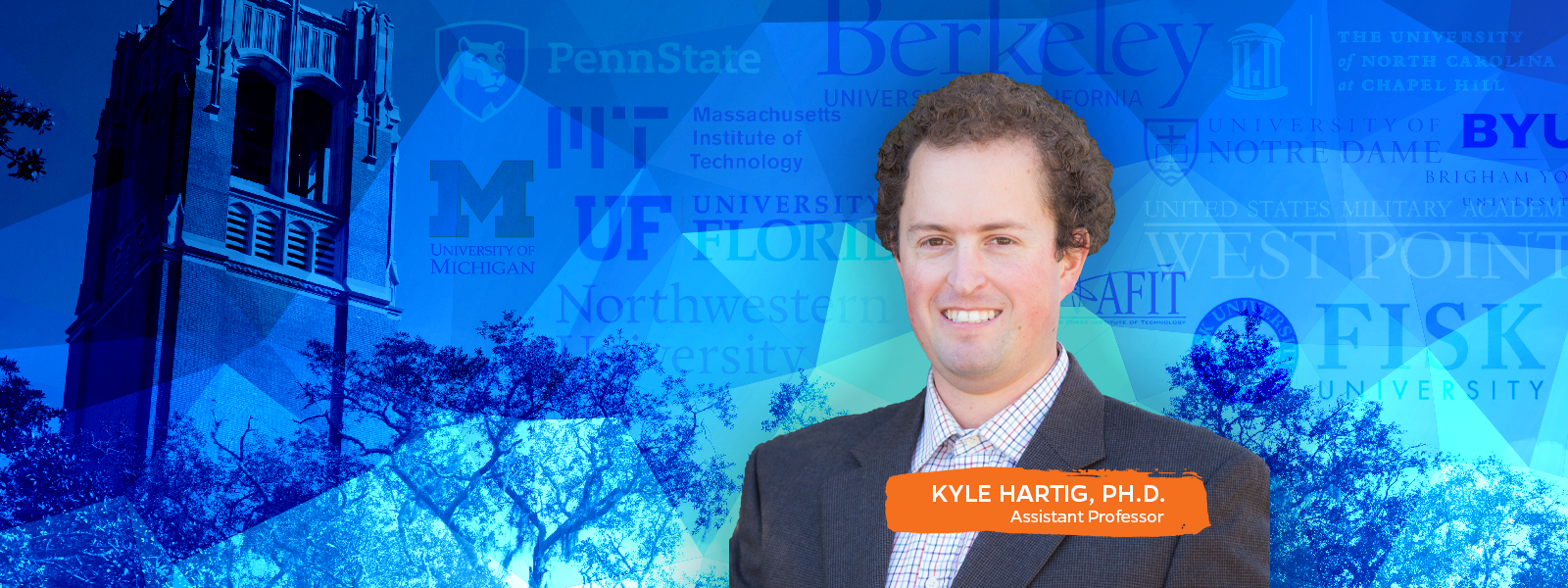Kyle Hartig, Ph.D., an assistant professor of nuclear engineering in the UF Department of Materials Science & Engineering (MSE), will lead a research team as part of the newly formed Interaction of Ionizing Radiation with Matter – University Research Alliance (IIRM-URA).
The alliance is funded by a $51.5 million Defense Threat Reduction Agency (DTRA) award. With a diverse coalition of 12 nationally recognized universities and 10 industry affiliates and national labs, the alliance will focus on identifying, understanding and exploiting the fundamental physics of interactions of ionizing radiation with matter.
Penn State, the University of Florida, the University of Michigan and the Massachusetts Institute of Technology are the partnership’s four permanent members.
The multidisciplinary, collaborative project will consist of three main research areas:
- Materials – Understanding material-radiation interaction
- Devices – Developing advances in devices and device integration
- Survival – Enhancing nuclear survivability and response
The UF team will oversee the Survival research area and will focus on the development of advanced electronics and radiological detection systems capable of surviving a nuclear detonation.
The funding will enable Dr. Hartig and co-investigators Steve Pearton, Ph.D., Michael Tonks, Ph.D., Juan Nino, Ph.D., and Nancy Ruzycki, Ph.D., to carry out the transformative research and technology development required to help combat the radiological threats associated with weapons of mass destruction (WMD).
“We, at the University of Florida, have historically and consistently been a leader for the Department of Defense in understanding radiation interaction with matter and survivability of electronics and materials following a nuclear detonation,” Dr. Hartig said. “With preeminent research facilities and capabilities, we’re uniquely capable of addressing the challenge of materials survivability following a nuclear detonation due to our expertise in experimental and theoretical radiation interaction with matter.”
Andreas Enqvist, Ph.D., nuclear engineering program director, recognizes the significance of the award and what it means for the department. “Dr. Hartig’s leadership and inclusion in it is a great achievement and an extraordinary milestone for our NE program,” remarked Dr. Enqvist. “We’re honored to play such a prominent role in the future of this field of research.”
In addition to advancing today’s research, the alliance is also looking to the future of ionizing radiation study with the establishment of a Young Investigator Award, a SEED Program and student pipeline programs. All three initiatives are aimed at developing a conduit of future researchers, engineers, scientists and industry professionals to ensure continued advancements in the fields of nuclear detection, survival, response, modeling and simulation.
As part of the program, an outreach initiative will connect high school students with real-world scientists and engineers for mentoring opportunities. IIRM Alliance members will aim to spark student interest through a hands-on approach to science, technology, engineering and mathematics (STEM), and contribute to the growth of the next-generation STEM workforce.
In the agency’s announcement of the award, U.S. Air Force Colonel Benjamin Ward, chief of DTRA’s Enabling Capabilities Research Division, stressed the importance of connecting with younger students. “Building up the nation’s capabilities in the area of scientific research and education has never been more important,” Ward said. “I, for one, believe that it is crucial to our national security that we reach out to students as early as possible during their scientific studies.”
